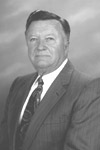About the Donor
 Stuart D. Lyda
Stuart D. Lyda, professor of plant pathology at Texas A&M University, was born in Bridger, MT, on June 6, 1930. Upon graduation from high school, he enlisted in the U.S. Marine Corps and served for four years, including 17 months in Korea during wartime. He received his B.S. degree in agricultural education and an M.S. degree in botany in 1956 and 1958, respectively, from Montana State University, Bozeman, and his Ph.D. degree in 1962 from the University of California, Davis. His dissertation, entitled “The Physiology Effect of Sodium Pentachlorophenate on
Sclerotinia fructicola (Wint.) Rehm,” was under the guidance of Dr. Joe M. Ogawa.
In 1962, Dr. Lyda began his career at the University of Nevada, Reno, as an assistant professor in the Department of Plant, Soil, and Water Sciences. His research focused on the soilborne organism Phymatotrichum omnivorum and its relationship to alfalfa. He remained in Reno for five years, where he was promoted to associate professor. In 1967, Dr. Lyda left Reno and took an associate professor appointment with Texas A&M University and the Texas Agricultural Experiment Station. He accepted the challenge to conduct research on Phymatotrichum root rot of cotton, a devastating soilborne fungal disease found across the blackland cotton growing regions of Texas, the southwestern United States, and northern regions of Mexico. Dr. Lyda headed up the Phymatotrichum root research effort for the next 27 years. In this era he led investigations into cultural and chemicals means of control of P. omnivorum and conducted extensive research on the epidemiology and ecology of P. omnivorum. In 1978, Dr. Lyda authored a chapter entitled “Ecology of Phymatotrichum omnivorum” for the Annual Review of Phytopathology. Dr. Lyda edited numerous papers for Phytopathology and Plant Disease. He also served on the APS Nomenclature Committee and the Soil Microbiology Committee, which he chaired. He was a member of the Soil Fungus Conference Steering Committee and secretary and head of the National Cotton Disease Council. He is a member of APS, Mycological Society of America, Alpha Zeta, Gamma Sigma Delta, Phi Kappa Phi, Who’s Who in the South and Southwest, and the American Institute of Chemists.
Dr. Lyda’s research interests were extensive and, because of his immense scientific curiosity, he never turned down a difficult project or left a question unanswered. As a mentor, Dr. Lyda’s photographic memory was a hurdle every one of his students had to overcome and of which all were envious. Dr. Lyda’s teaching responsibilities encompassed three courses in addition to graduate student counseling. He taught the undergraduate plant pathology class, a course on action of pesticides, and a graduate course on physiology of fungi. His tests and the problems on those tests in physiology of fungi will be long remembered by each of his students—“you cannot make an ‘A’ without being able to do the problems” was his motto.
During Dr. Lyda’s research and teaching career, he guided more than 40 students in master or doctorate programs, contributing to 37 publications and numerous technical bulletins. His ability to motivate and challenge students to reach beyond the classroom and laboratory and to explore life to its fullest encouraged students to always reach for new frontiers. Dr. Lyda was a teacher in every sense of the word. He constantly pushed each individual to go beyond the norm. He challenged students to learn something new every day and to think of all the consequences and opportunities of their endeavors. Dr. Lyda allowed students to ask questions and to learn on their own, but they all knew he was in the background if they needed him. He won a teaching award from the students of the Plant Science Department in the 1980s. Dr. Lyda took time from his personal life to serve as chaperone for numerous field trips for plant pathology graduate students and he drove the student van to several APS meetings so that students could afford to attend the meetings. His former students best remember Dr. Lyda for his strong convictions and his ability to get each of them to think and to form their own opinions. The establishment of this student travel award in his name seems fitting to this outstanding teacher, mentor, and plant pathologist. The tradition of learning and shaping plant pathologists for the future may be carried on in his name for generations to come.
Dr. Lyda is retired and lives with his wife JoAnne in Bryan, TX. He has been married since 1952 and has five children and 13 grandchildren. Since retiring, he enjoys traveling in his motor home and has been on several trips in the United States and abroad.
Stuart Lyda passed away on June 24, 2020.
